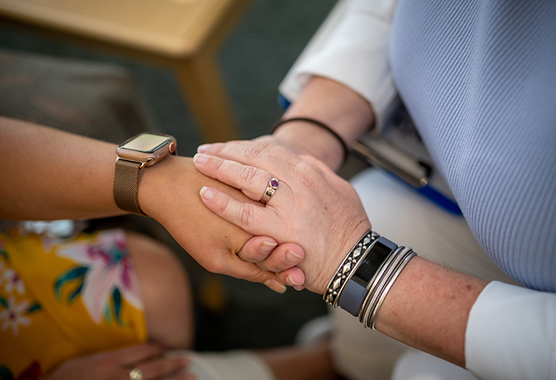Lymphoma
We offer advanced care for lymphomas (blood cancers), including Hodgkin lymphoma and non-Hodgkin lymphoma.
Medically reviewed by Brian Jonas, M.D. on Oct. 12, 2023.

Cutting-Edge Care and Treatments
Many lymphomas are highly treatable. When you come to UC Davis Comprehensive Cancer Center, you receive expert care from the region’s largest and most comprehensive Leukemia, Lymphoma, and Multiple Myeloma program.
Our specialized team of blood cancer specialists provides fast diagnoses and the latest treatments. You also benefit from cutting-edge therapies available through clinical trials.
What Is Lymphoma?
Lymphoma is the most common hematologic cancer (blood cancer). It occurs in lymphocytes (white blood cells). Your lymphatic system makes lymphocytes to help your immune system fight infections.
There are two main types of lymphoma:
- Hodgkin lymphoma: Abnormally large lymphocytes called Reed-Sternberg cells form in your lymph nodes. These cancerous cells travel through your bloodstream.
- Non-Hodgkin lymphoma: This blood cancer develops in your lymphatic system. There are more than 60 subtypes of non-Hodgkin lymphoma.
Lymphoma Symptoms
Lymphoma symptoms vary depending on the type. Early symptoms are often mild and can be easy to dismiss.
Common Symptoms
Signs of lymphoma include:
- Enlarged lymph nodes (that aren’t painful) in your neck, armpits or groin
- Fatigue and fever
- Night sweats
- Unexplained weight loss
Lymphoma Causes and Risk Factors
Changes (mutations) in the genetic makeup of blood-forming cells cause blood cancers like lymphomas.
A cell mutation (change) causes abnormal lymphocytes to multiply faster or live longer than healthy lymphocytes. These cancerous white blood cells travel through your bloodstream and lymphatic system. They may settle in your lymph nodes, spleen, bone marrow and organs.
Other factors that can increase your risk of lymphoma include:
Age
Hodgkin lymphoma tends to occur during your 20s or after age 55. Non-Hodgkin lymphoma is more common after age 60.
Biological Sex
Males are more likely to develop lymphoma than females.
Family History
Having a close relative with a blood cancer may increase your risk.
Race
Lymphoma tends to affect people who are white more than other races or ethnicities.
Viral Infections
Viral infections, such as the human immunodeficiency virus (HIV) and mononucleosis, may lead to lymphoma.
Weak Immune Systems
Autoimmune diseases, immunosuppressant drugs or organ transplants can weaken your immune system. An impaired immune system makes you prone to lymphoma.
Lymphoma Diagnosis and Testing
Our blood cancer specialists expertly perform biopsies to diagnose lymphoma. Your provider may remove tissue from an enlarged lymph node or the entire node. A lab checks the sample for cancer cells.
If a biopsy indicates lymphoma, you may also get these tests:
- Bone marrow aspiration and biopsy: Your provider removes blood and a tiny piece of bone from inside your hip bone. A lab examines the sample to determine the cancer stage.
- Imaging tests: Medical imaging tests, such as a CT scan or MRI, can show an enlarged spleen or lymph nodes that may indicate cancer.
Lymphoma Treatments
Lymphoma treatments depend on the type, stage and symptoms. The goal is to put the cancer into remission, which means you have no signs of the disease. We offer a complete range of advanced lymphoma treatments.
Chemotherapy
Chemotherapy is the main lymphoma treatment. These drugs circulate in your bloodstream, where they destroy cancer cells.
Radiation Therapy
Radiation therapy often takes place after chemotherapy. High-energy radiation destroys cancer cells and stops them from multiplying. We offer all types of radiation therapy.
Immunotherapy
Immunotherapy drugs, such as monoclonal antibodies, help your immune system find and destroy cancer cells.
Stem Cell Transplant
A stem cell transplant replaces diseased cells with healthy ones. Your body starts to make new, cancer-free blood cells.
“About Lymphoma and Lymphoma Subtypes,” Lymphoma Research Foundation, https://lymphoma.org/understanding-lymphoma/aboutlymphoma/
“NHL Subtypes,” Leukemia & Lymphoma Society, https://www.lls.org/lymphoma/non-hodgkin-lymphoma/nhl-subtypes
Average age
39Of lymphoma diagnosis
Ages
15-19Hodgkin lymphoma is most commonly diagnosed cancer in teens
Sources:
American Society of Clinical Oncology: Lymphoma – Hodgkin: Statistics
Request an Appointment
Our cancer specialists provide thorough evaluations and personalized treatment plans. Learn more about how to make an appointment at UC Davis Comprehensive Cancer Center.
Patients
New Patient Referral Office
916-734-5959
UC Davis Health Referring Physicians
For providers in UC Davis Medical Group or our Cancer Care Network
Physician Referral Center
916-734-5959
External Referring Physicians
For providers who are external clinicians
Referral Office
800-770-9261

Ranked among the nation’s best hospitals
A U.S. News & World Report best hospital in cardiology, heart & vascular surgery, diabetes & endocrinology, ENT, geriatrics, neurology & neurosurgery, and pulmonology & lung surgery.

Ranked among the nation’s best children’s hospitals
U.S. News & World Report ranked UC Davis Children’s Hospital among the best in pediatric nephrology, orthopedics*, and pulmonology & lung surgery. (*Together with Shriners Children’s Northern California)

Ranked Sacramento’s #1 hospital
Ranked Sacramento’s #1 hospital by U.S. News, and high-performing in aortic valve surgery, back surgery (spinal fusion), COPD, colon cancer surgery, diabetes, gynecological cancer surgery, heart arrhythmia, heart failure, kidney failure, leukemia, lymphoma & myeloma, lung cancer surgery, pacemaker implantation, pneumonia, prostate cancer surgery, stroke, TAVR, cancer, orthopedics, gastroenterology & GI surgery, and urology.

The nation’s highest nursing honor
UC Davis Medical Center has received Magnet® recognition, the nation’s highest honor for nursing excellence.

World-class cancer care
One of ~59 U.S. cancer centers designated “comprehensive” by the National Cancer Institute.

A leader in health care equality
For the 13th consecutive year, UC Davis Medical Center has been recognized as an LGBTQ+ Healthcare Equality Leader by the educational arm of America’s largest civil rights organization.

